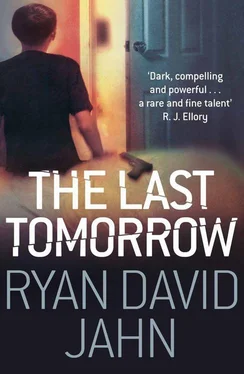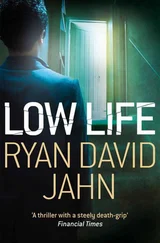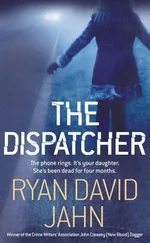Ryan Jahn - The Last Tomorrow
Здесь есть возможность читать онлайн «Ryan Jahn - The Last Tomorrow» весь текст электронной книги совершенно бесплатно (целиком полную версию без сокращений). В некоторых случаях можно слушать аудио, скачать через торрент в формате fb2 и присутствует краткое содержание. Год выпуска: 2012, ISBN: 2012, Издательство: Macmillan Publishers UK, Жанр: Триллер, на английском языке. Описание произведения, (предисловие) а так же отзывы посетителей доступны на портале библиотеки ЛибКат.
- Название:The Last Tomorrow
- Автор:
- Издательство:Macmillan Publishers UK
- Жанр:
- Год:2012
- ISBN:9780230766501
- Рейтинг книги:4 / 5. Голосов: 1
-
Избранное:Добавить в избранное
- Отзывы:
-
Ваша оценка:
- 80
- 1
- 2
- 3
- 4
- 5
The Last Tomorrow: краткое содержание, описание и аннотация
Предлагаем к чтению аннотацию, описание, краткое содержание или предисловие (зависит от того, что написал сам автор книги «The Last Tomorrow»). Если вы не нашли необходимую информацию о книге — напишите в комментариях, мы постараемся отыскать её.
The Last Tomorrow — читать онлайн бесплатно полную книгу (весь текст) целиком
Ниже представлен текст книги, разбитый по страницам. Система сохранения места последней прочитанной страницы, позволяет с удобством читать онлайн бесплатно книгу «The Last Tomorrow», без необходимости каждый раз заново искать на чём Вы остановились. Поставьте закладку, и сможете в любой момент перейти на страницу, на которой закончили чтение.
Интервал:
Закладка:
Sandy stares at the ceiling.
And, after a while, closes his eyes.
THIRTEEN
1
Next morning, nine o’clock, Candice sits on a chair in the corner of the living room, her back straight, her hands resting flat on her thighs. She wears a gray wool skirt and a white blouse with ruffles running down the front, conservative when compared to her work attire, and her blonde hair is pulled back and twisted into a tight bun, making her look severe. She wears no makeup. Someone used to seeing her at the Sugar Cube with lips smeared red, eyes shaded blue, and blush on her cheeks wouldn’t recognize her. Compared to that woman this one is thin-lipped and terribly sad.
She stares at the couch, at the bloodstains on the floor in front of it. It’s a strange thing, a thing she doesn’t understand at all, but despite the fact she misses Neil very much, there’s a part of her that is angry with him. Angry with him for dying, yes, and angry with him, too, for being the reason her innocent boy is no longer innocent. The reason he’s no longer here. Neil’s the one who filled him with so much violence he could no longer contain it. Neil’s the one who taught him what violence was through demonstration. The lessons we remember are the ones that hurt us. She knows Neil thought he was doing right. She knows he wanted Sandy to be strong and good and was trying to make him that way. But he was wrong, and now he’s dead.
And Sandy’s locked away.
There’s no logical reason for it to be so, but she believes she can feel the distance between her and her son, a great sucking hollow. Some antediluvian instinct, some primordial soul-nerve, feels her son’s absence, and there is within her a great urge to get him back, whatever the cost, to get him back to fill that empty space.
She thinks she’s going to take the couch out to the curb later today or tomorrow morning. She can’t stand to sit on it. She knows that’s where Neil was killed and can’t stand even to be near it.
Then there’s the pity and hatred in her neighbors’ eyes. They pity her for her loss, of course, poor thing, but there’s something in people that makes them also hate someone who’s been the victim of a tragedy. Part of them believes she must have had it coming. She must have had it coming because nothing like that could ever happen to them.
They’re safe. They’re secure. They need worry neither about God’s indifference nor the unlocked door.
The bell rings and Candice jumps, her heart pounding wildly in her chest.
‘I’ll be right there,’ she says once she is again calm.
She gets to her feet, pulls open the door, and is greeted by an egg-shaped bald man in a blue suit and a red bowtie. He says hello and she says hello.
She walks with him to his car and gets into it.
2
She speaks very little on the way to the detention facility. She sits in this tidy Buick and looks ahead at the road and wonders if this man from the district attorney’s office will really help her son. She supposes she’ll find out soon enough.
The road hums beneath the car tires. The radio plays jazz music softly.
3
After fourty-five minutes on the road, the car turns left into a dirt driveway. It rolls up the driveway, stopping at a metal gate. A guard asks the man behind the wheel what his business is. He shows identification and says he’s here from the district attorney’s office to see Sanford Duncan. This is the boy’s mother. The guard opens the gate, waves them through, shuts the gate behind them.
They park and are greeted by a gray-haired man in a wrinkled suit. He leads them into a small room with a table and four chairs at its center. There’s a glass ashtray in the middle of the table. It’s lined with a film of gray ash. Any cigarette butts it once contained have been removed. Simply the sight of it makes Candice want to smoke — that and her nervousness — but despite the urge she doesn’t reach for her cigarettes. Something about Mr Carlyle reminds her of a strict schoolteacher. She feels the need to be on her best behavior lest she take the metal edge of a ruler against the back of a wrist. Shoulders straight, young lady.
Mr Carlyle sits at the table and opens his briefcase, looking through it briefly. He leans back, absently reaches to his nose, pinches a hair between the pad of his finger and his thumbnail, yanks it from his nostril. He flicks it to the floor, folds his hands in his lap, waits. Blank-eyed, the picture of patience.
Candice paces the floor — back and forth, wall to wall — wondering why on earth this room is as small as it is. And the more she paces, the smaller it feels. It seems like it takes fewer steps to pace the width of the room each time she does it. She knows that’s impossible, but it feels that way just the same.
Then the door opens. Sandy stands on the other side. At first his face is blank, then he sees her and it contorts with sad hope and love and after a moment of hesitation he runs to her and hugs her, wraps his arms around her neck and puts his face into her hair. She hugs him back. He says he’s sorry, so sorry.
‘I’m sorry, Momma.’
He hasn’t called her Momma in years but he calls her that now. She says she knows he’s sorry, she knows that, she should have seen what was happening, it’s as much her fault as his. She should have seen what was happening and stopped it.
‘I’m sorry too, Sandy.’
She believes what she says.
‘Our time is limited,’ Mr Carlyle says, his voice even. ‘Perhaps we should get to the matter at hand.’
Candice stands and wipes her eyes. ‘Of course.’
Mr Carlyle leans toward Sandy and introduces himself.
Sandy shakes his hand when it’s put forward.
‘Why don’t you and your mother have a seat?’
‘Yes, sir.’
Sandy sits down across from Mr Carlyle. Candice takes a chair to the side. She looks at her boy, at her son, whom she was breastfeeding only twelve years ago, and tries to see a murderer, but cannot. And yet, she realizes now, a small part of her hates him as a small part of her hates Neil. The part of her that knows what he’s done despite the fact she cannot see it on him or in him. It’s a horrible feeling, to love someone completely and to simultaneously hate them. She’s never experienced it before and now she feels it both with Sandy and the man Sandy killed. It makes her feel there’s a diseased cavity within her heart, black and decaying. She imagines she can feel the disease eating the good parts away from the inside out, leaving a black hollow, like the trunk of a rotting tree.
‘I’m from the district attorney’s office,’ Mr Carlyle says.
Sandy says nothing. He wipes at his nose with the back of his wrist.
‘I’m here today,’ Mr Carlyle says, ‘because I think we can avoid your case ever going to trial. You see, my boss, Mr Seymour Markley, believes that you are, in all likelihood, every bit as much a victim as the poor man who was killed, just as much a victim as your stepfather.’
Mr Carlyle removes something from his briefcase and sets it on the table: a comic book. Candice recognizes it. It’s clear from his expression that Sandy does as well. He’s pale and a bit sick-looking.
‘We believe,’ Mr Carlyle says, ‘that this comic book is the reason your stepfather’s dead. We believe its violence and filth contaminated your mind. We looked into your school records. You’ve not been in many fights. You don’t act out in class more than any intelligent boy would. You haven’t missed an excessive amount of school. You get good grades. Yet you killed your stepfather. You took a straight razor to your stepfather’s forehead, same as a character in this comic book does. I look at these facts, and I see where the anomaly is. Now,’ Mr Carlyle licks his lips, ‘now, when did you start reading comic books, Sandy?’
Читать дальшеИнтервал:
Закладка:
Похожие книги на «The Last Tomorrow»
Представляем Вашему вниманию похожие книги на «The Last Tomorrow» списком для выбора. Мы отобрали схожую по названию и смыслу литературу в надежде предоставить читателям больше вариантов отыскать новые, интересные, ещё непрочитанные произведения.
Обсуждение, отзывы о книге «The Last Tomorrow» и просто собственные мнения читателей. Оставьте ваши комментарии, напишите, что Вы думаете о произведении, его смысле или главных героях. Укажите что конкретно понравилось, а что нет, и почему Вы так считаете.












